Why It’s Worth Investing in Your Business Blog Content

I'll say up front that I'm a bit biased. I'm the CEO of a content marketing agency, so of course, I'm going to tell you that blogging is a good investment for your business.
But you know what? It is. All of my clients have experienced growth through their blogs, both before and after I took over for them. They're far from alone, either; thousands of businesses in every industry have seen what a blog can do. Small businesses become large, large businesses become household names, and complete unknowns become visible.
The problem I see most often is one of perspective. Business owners tend to look at blogging in comparison to other marketing strategies.
When you compare, say, Google Ads and Facebook Ads, it's an easy test to run. Set the variables, run ads for a month or two, evaluate your return on investment, and pick the better option. You can't do that with blogging. Blogging is a long-term investment.
I compare blogging to a lot of different things, but for the sake of this article, let's compare it to a snowball or an avalanche. A single snowflake doesn't do much. A few dozen snowflakes still don't do a whole lot. But when they start to pile up in numbers and attract others over time, they can start to snowball and have a massive impact.

The difference is, an avalanche stops. It settles down. Blogging doesn't. I still have blog posts from over 10 years ago that are still getting stable traffic. Theoretically, there's no cap to the amount of value you can get from a blog. A blog could, potentially, help turn a no-name brand into a household name, and has for many bloggers (some of which are probably already coming to your mind).
Let's expand on that compound value a bit.
 30 Second Summary
30 Second Summary
Blogging benefits businesses. Customers become more visible and grow, changing from small businesses to household names. Unlike Google or Facebook Ads, blogging is a long-term strategy compared to a snowball or avalanche - growth over time. As more blog posts are created, more viewers convert into customers. Blog posts target different user groups and stand as opportunities to convert viewers into subscribers or customers. Blogging offers growth and benefits such as thought leadership and brand awareness, which aren't always measurable by profit.
Compounding Value
When you first start a blog, from an SEO perspective, it is essentially invisible. The only views it gets are from you, the people you have working on it, and the friends and family you show it to. If you're a business with an existing audience, you might be able to convert some of that audience into new blog readers by advertising it in your retail location or on your website.
That's not much. You're thinking maybe tens, maybe a hundred visitors on each of your blog posts per month on average. When you think about the scale of the internet – which has billions of users, billions of daily Google searches, and hundreds of thousands of petabytes of data transferred monthly – a hundred views is nothing. It's less than a rounding error. A successful blog might get a few thousand visitors per day for years without skipping a beat.
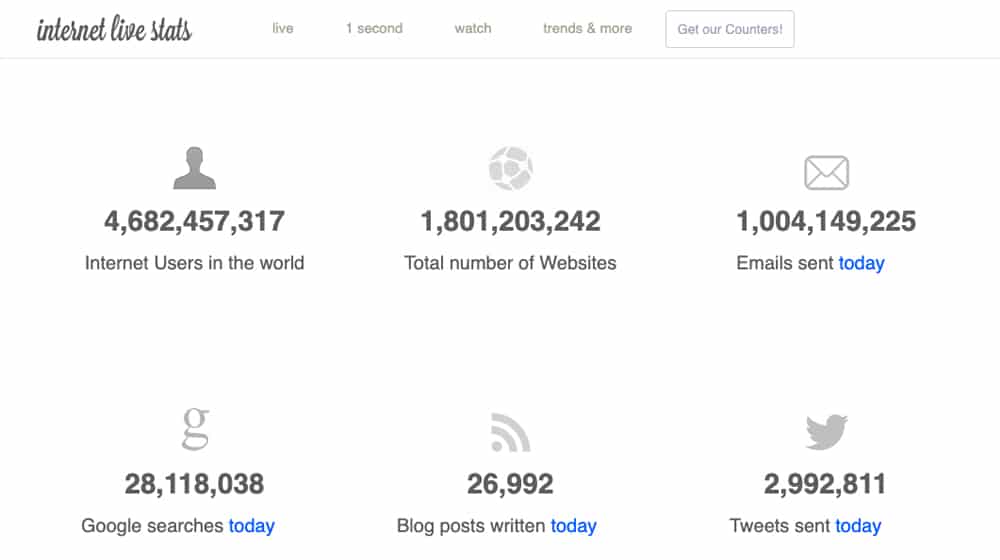
Let's put together some hypothetical numbers based on that math
- Each blog post attracts around 100 visitors per month from search engines, referrals, and direct traffic.
- Your blog converts at about 2%, which is the average blog conversion rate.
- That works out to 24 people converting every year, who most likely wouldn't have converted without first landing on your well-written blog article.
Now add a second blog post. You're doubling the number of posts, and thus the number of views, and thus the number of conversions. Of course, if you're a business used to selling to hundreds or thousands of customers per month, 24-48 extra customers per year isn't much. That's why blogging is an ongoing investment.
Let's say you're publishing two blog posts per week:
- At 52 weeks per year, that's 104 blog posts (we'll round it to 100 for easier math and because some people end up taking holidays off, missing the occasional post).
- At 100 blog posts in a year, each with 100 views per month, you're looking at approximately 120,000 views per year.
Keep going. Two years in, you have 200 posts. Three years in, you have 300.
And you know what? None of your posts are going to sit at 100 hits per month. Some will have less, for sure. Some will have drastically more. A viral post can give you a day or two of tens of thousands of hits. Maybe you capture some of them, some of them stick around, and some of those people convert. Perhaps you start some A/B testing and figure out a way to change your call to action to something more appealing, squeezing even more results out from your daily visitors.
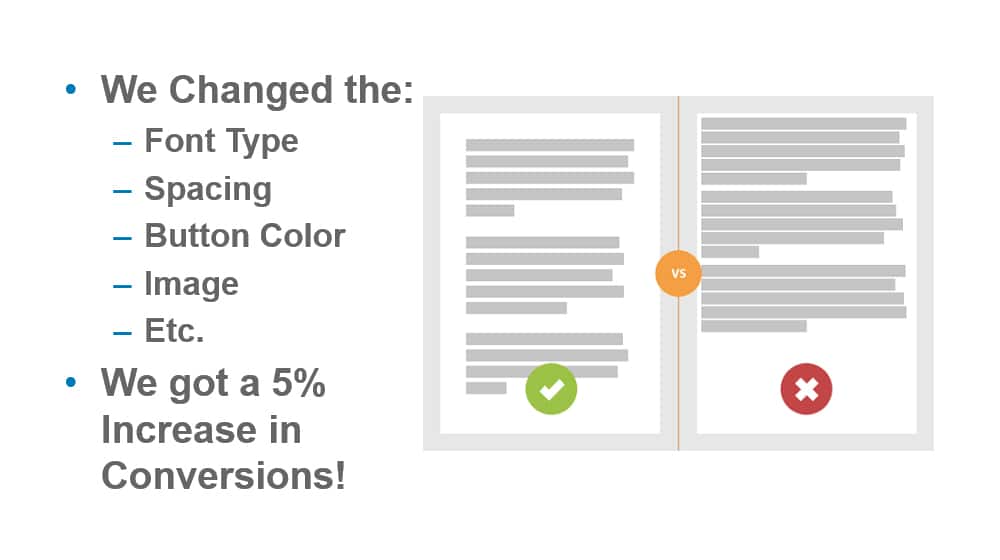
Life is a lot messier than my hypotheticals, of course. I'm just giving you a linear example to illustrate the point. You can't compare a content marketing strategy to any other strategy, because no other marketing strategy is comparable; blogging isn't a short-term plan and you can't expect linear growth. Blogging doesn't start working immediately, at least not without significant additional investment (which I've written about elsewhere). It takes time, but once it starts working, it doesn't stop working unless you abandon it, and it tends to ramp up.
The problem, as I've mentioned plenty of times before, is most people who are new to blogging give up before they start to see results.
Every Post Is a Billboard
How do people find your business?
Advertising, right?
So let's think about advertising. Every ad you run is an opportunity. You're paying to make sure people see the ads, whether it's from Google, from Facebook, from a TV commercial, or a billboard on the highway.
Your blog is in many ways similar to billboards, except instead of reaching people while they're driving or browsing Facebook, you're reaching them while they're searching for something online, and they're providing value. You also have complete control over how those web pages look.
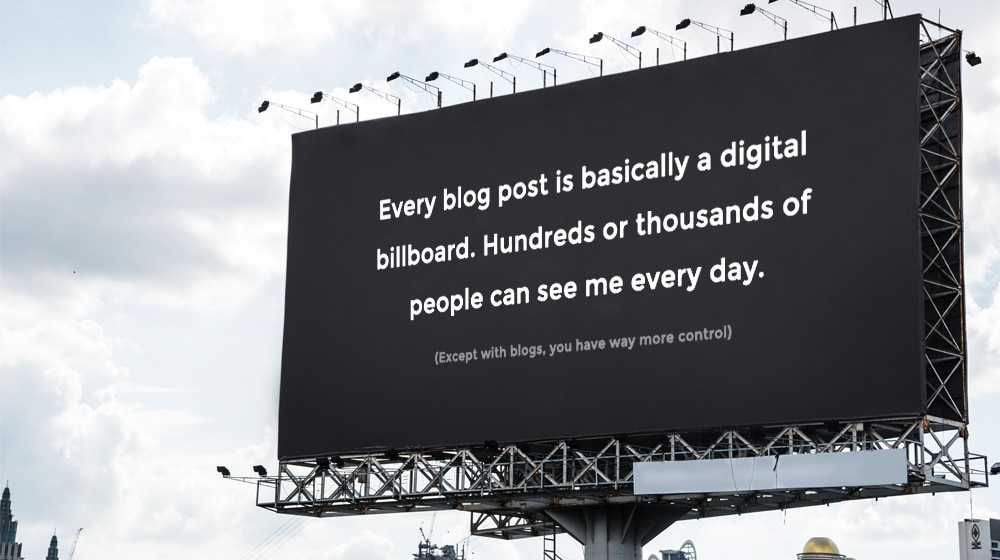
Every single blog post you write is different and unique. They all target users in different phases of thinking, with different goals and interests. One post might target people who are searching for information about your business, and another might target people looking for something related to a problem your product can solve.
This is why topic ideation and keyword research are so important. Every single post you write targets a unique group of people on an ongoing basis. The audience changes; people who search for information learn the answer, but others may have the question later. There's always going to be that audience, so there will always be people finding your post answering the question.
Every single blog post is an opportunity. It's a chance for people to find your blog, your site, your brand, your business. It's an opportunity for you, via calls to action, on-site advertising, pop-ups, and other methods, to hook them. You can get them to become aware of you. You can get them to become subscribers to your mailing list. You can get them to read more about your product on your landing pages. You can get them to convert into subscribers or customers.
We create blog content that converts - not just for ourselves, but for our clients, too.
We pick blog topics like hedge funds pick stocks. Then, we create articles that are 10x better to earn the top spot.
Content marketing has two ingredients - content and marketing. We've earned our black belts in both.
The more blog posts you invest in, whether you write them yourself or pay to have them written, the more topics you cover, and the more people you can reach in different audiences. The more people you reach, the more awareness of you they have, the more trust in you they build, and the more they see you as an authority and a resource. The more people view you in a positive light, the more people give you money for whatever it is you provide them.
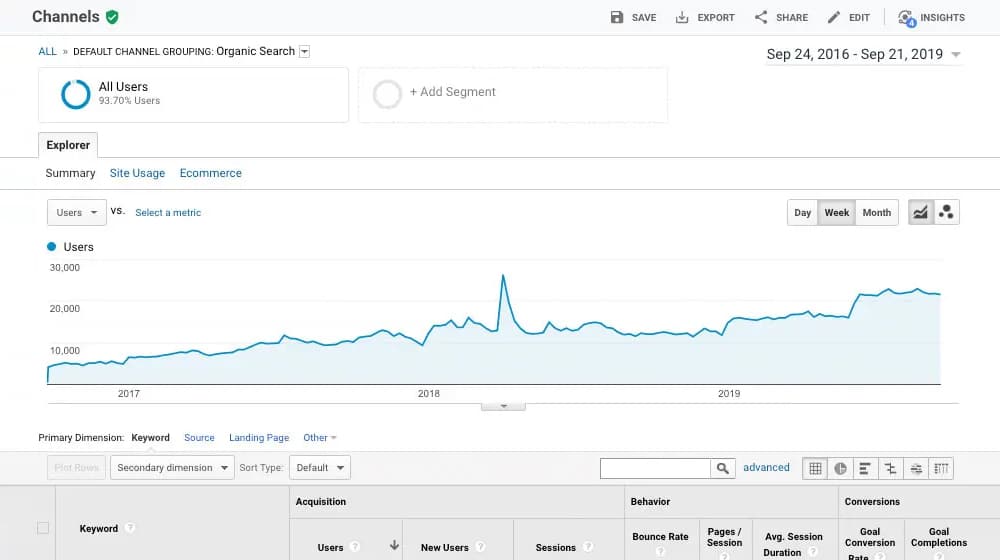
Incidentally, this is why most content marketers say you should write primarily about your subjects and industry, not about your business products and brand. The more self-focused your content, the more overlap you have between posts – since there are only so many things you can say about yourself – and the fewer different groups of people are searching for that information. Besides, if your articles are biased, it hurts your trust and the value of your content, and search engines are smart enough to get a sense of when this is happening.
Intangible Benefits
There are a lot of benefits to blogging that aren't measurable on the bottom line. Sure, to most people, the goal of a business is to make a profit. There's nothing wrong with that. The problem is when you start to ignore aspects of business and society in favor of that profit line.
Blogging probably won't turn a profit for a while. It can and will, eventually, but it might take months or years depending on your investment. The more you invest in things like content, marketing, and blog management, the faster you will grow, but the bigger the "hole" you need to dig out of to make a positive return on investment. But that's fine!
There are a lot of things you get out of blogging that don't directly translate into sales or dollars. For example:
Thought leadership. Why do you trust the people you do? There are a lot of reasons. The people you trust often have experience or a prominent position within their industries, and a history that you've experienced. Maybe you watched them grow from where they started. Maybe they were a friend in high school. Maybe they've just shown, time and again, that their insights are on the money.
A blog helps you achieve this level of trust. A blog can position you as a thought leader. Because you know what? You own a business. You have experience. Why shouldn't people look to you for advice?
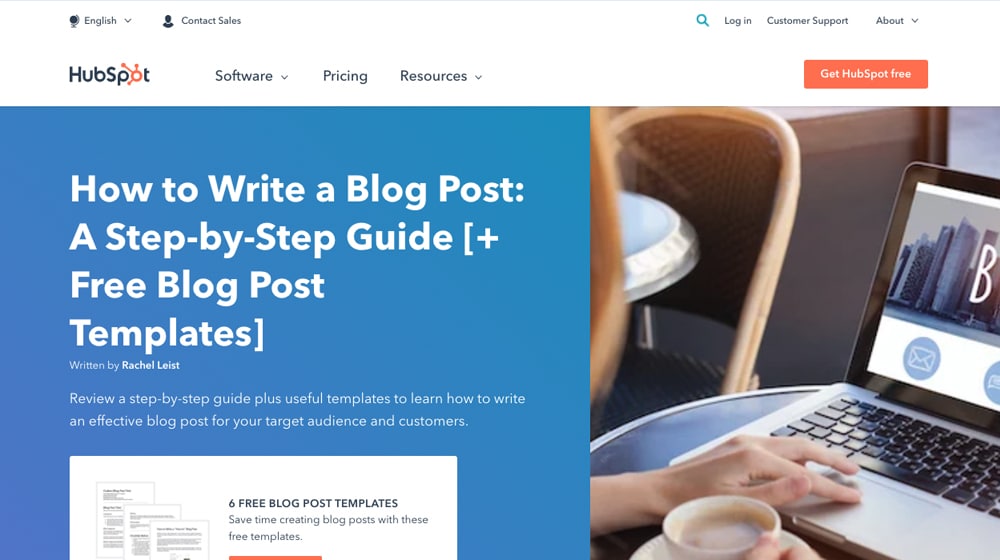
A position of thought leadership gives you opportunities. Of course, it's also full of responsibility. People will come to you with questions, looking for your insight. You have to answer them since engaging with the community is part of what thought leadership entails.
Brand awareness. A blog makes people aware of you, plain and simple. This happens in two ways: through recognizing your brand, and through recognizing you as an author.
With brand awareness, people start to recognize your name, domain, logo, and site design when you answer their questions. You can see this yourself. Just try to pick any random topic and research it. Ask questions through Google, and see what sites come up. You may go through several search results to synthesize an answer that sounds right to you.
After five or ten questions, and after researching a few related topics, you'll notice something. You've identified a handful of websites that seem to consistently provide the best information on the topic. You didn't know or care about them before you started – assuming you picked a topic you didn't already have some knowledge of – but now you recognize them. You're not about to buy their products, but you know what? If a time comes in six months, when your interest in the topic has grown and you might want to start a hobby or something, you'll recognize those brands. When given the choice between a brand you recognize and a brand you don't, you're more likely to buy from the one you do.
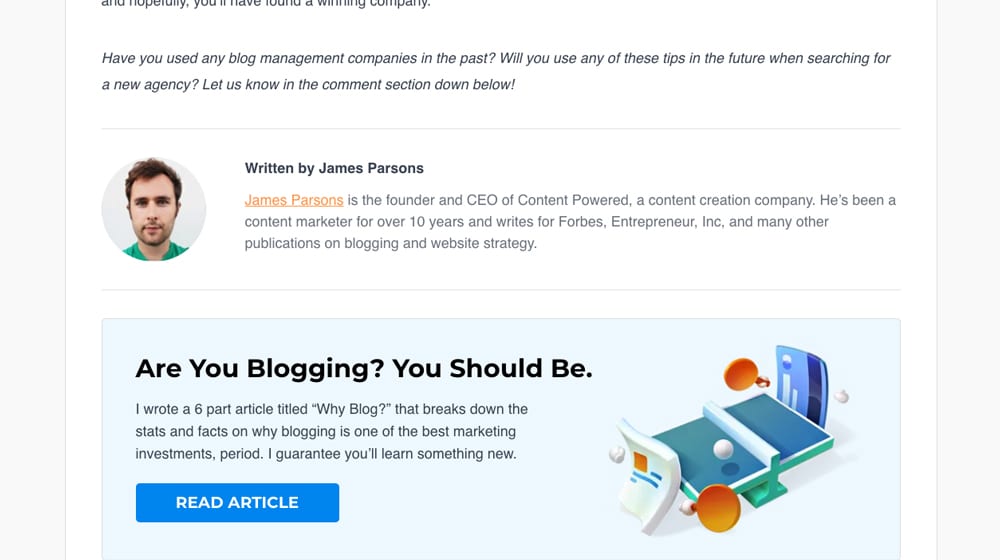
The other form of awareness comes from your face. Take me, for example. You see my smiling mug at the bottom of every post I write. Maybe you're reading content on another site, like Forbes, and you happen to see that same smiling face. You recognize me, and while maybe you don't inherently recognize from where, you know you've trusted what I've written before.
That's why people like Neil Patel, Jon Loomer, and a million commentators and opinion writers on news sites have pictures of themselves on everything they write. It's name and face recognition, which correlates to trust.
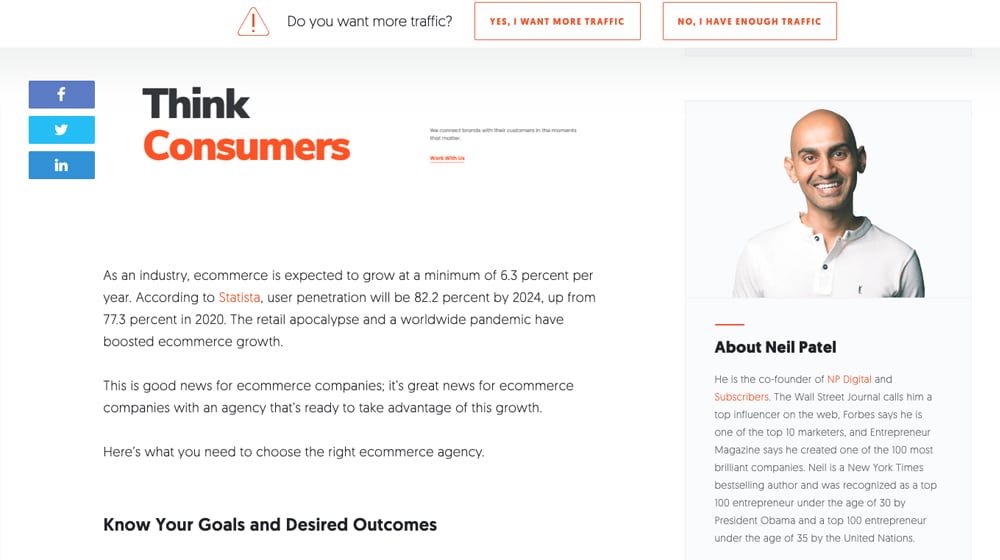
Industry networking. As you grow and people recognize you, your site ranks better, and you become more prominent, people start to come to you. They might email you with questions for an interview post. They might want a more detailed one-on-one interview. Local news might interview you as a prominent businessperson.
More importantly, you can reach out and start to foster relationships. You have a blog you can point to, to showcase who you are and what you do. You can ask for everything from guest posting opportunities to business partnerships and achieve a new position from which you can negotiate.
Industry networking helps you grow your site with links and your reputation. Maybe a large customer comes your way because they saw you or you were recommended by someone they trust. Maybe someone has a book they want to be written and they want your expertise to write it. Who knows? The sky is the limit, and all it takes is one opportunity to make the whole blog worthwhile.
An Organic Source of Growth
Another of the huge benefits of a blog is that it's an organic source of growth. Yes, I know a blog can be expensive, and I know that expense turns off a lot of business owners. I'm working on another post specifically about this topic, so you can find that when it's published as well.
The important part is that a blog is not considered paid advertising. You invest money in it, sure. Tools for keyword research, blog management tools, content writing; these all cost money. It doesn't have to, though. You can run a blog with a handful of one-time investments, as long as you're willing to take the time to do the legwork yourself.
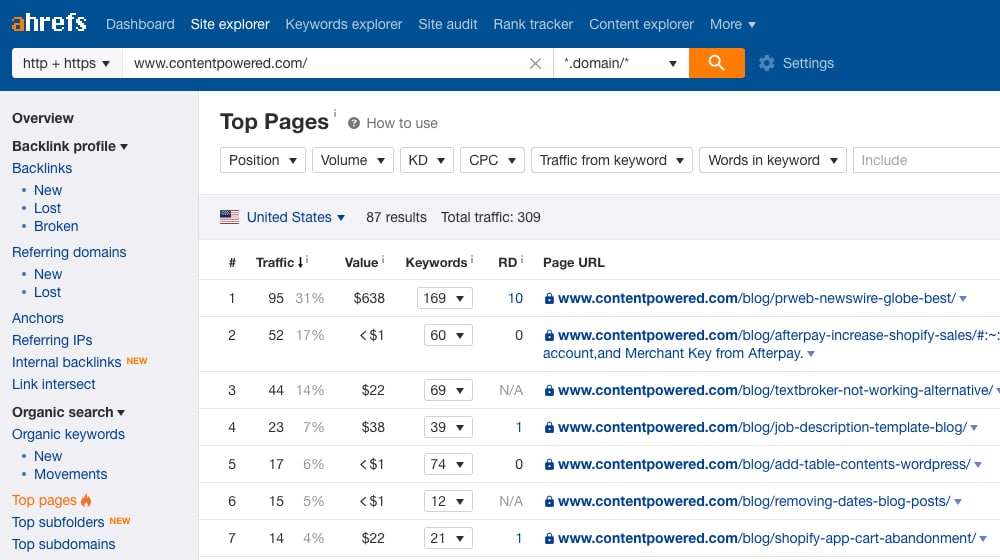
What's important is that blogging works whether or not you're dumping money into it. If you can write good content, it's still good content for your blog, no different than if you had paid for the content to be written. That content still reaches people and still pulls them in.
Every other marketing channel relies on money to keep going. If you're paying for ads on Google, and you stop paying for those ads, any traffic you were getting from them disappears. Radio ads, TV ads, billboards; it's all the same. When you stop putting money in, you stop getting value out.
A blog doesn't have this problem. If you decide to stop paying for a topic ideation tool, you might find it more difficult or time-consuming to come up with topic ideas, but it doesn't prevent your blog from working. If you choose to stop paying for content, your blog still functions; the old content doesn't disappear. You simply have to write more on your own.
What Do You Think?
Where do you stand on the topic of blogging? I have a lot of small business owners who read my content and who are on the cusp of being convinced. What's stopping you? I'd like you to voice your concerns in the comments. I'll be able to address them directly, and if they're deep enough, I can even write a whole other post about them. Let me know what you think!



 30 Second Summary
30 Second Summary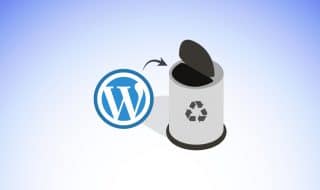


October 14, 2020 at 2:32 am
I'm worried that it will cost me more than what I will gain if I put up a blog. I am not a writer and I think hiring one is pretty expensive. Do you have any recommendations for this?
October 19, 2020 at 7:18 pm
Hi Claire!
My recommendation is to start slow and stick to a regular schedule.
Blog posts are unlike most other forms of marketing. With each article, you're investing once into a single page of content, and that page will attract visitors for years to come.
Even if that blog post doesn't result in a sale or conversion for weeks, months, or years, eventually it will.
That's really the benefit of blogging and what gives it an edge over other forms of marketing - it's a long-term investment.
Starting a blog is painfully slow and anxiety-inducing. It helps if you understand that before you go into it.
You're building an army of blog posts, and starting with a few articles, you can't expect a great deal of performance yet.
When that gets into the dozens, hundreds, or thousands of high-quality articles, it will be a lot easier to justify growing your blog when your sales figures can justify it.
Just remember to zoom out. It's impossible to judge a blog article after publishing it, it can take years to really know how valuable it is and for it to rise in the rankings. This is why many people quit before they see results - they get impatient and don't yet have a fundamental understanding of how blogging works yet.
November 27, 2020 at 11:45 am
How long until blogging starts to pay off usually? Am I looking at a few months or a few years?
November 30, 2020 at 8:39 pm
Hi Kirk! It depends on a lot of factors - the competition in your industry, the product or service you're selling (margins, demand, price, etc), the quality of your content, the size and age of your site, etc. With most businesses, you'll start to see results within 1 year of blogging, but you probably won't be happy with your results before 1-2 years. Beyond that, you'll be breaking records every year. Our happiest clients are those that have stuck with blogging for several years or longer and are attracting 10,000+ visitors per day.
It's just a matter of building up that "army" of blog posts to go to work for you every day. It takes a little longer when you're starting out with a brand new site or a site with very little content or authority.
I hope this helps!
January 28, 2021 at 7:04 am
Running a small business and I considered putting up a blog but I am worried that it's much more expensive compare to running ads. Do you have any comparison of the 2 so I can gauge what is best for my business?
January 29, 2021 at 7:14 pm
Hey Adrienne!
There are a lot of factors at play here.
Blogging can, in theory, be "free", if you're the one who's writing the articles.
The price can vary wildly from $0 per article if you're doing it yourself, to $1,000+ per article if you're having an agency create sophisticated long-form content for you.
Ads are sort of the same way. Some people's cost per click and cost per conversion are so low that they can run ads 24/7, and others pay $50 or $100 per click.
It depends on your industry and the competition.
An important thing to note is that with blogging, you're investing in your website and its long-term success. If you stop blogging, your traffic doesn't stop with it - you'll continue to receive visitors for years to come.
If you stop your ads, your traffic comes to a screaming halt.
There's also the matter of compound growth - blogging results accelerate over time naturally, and ads usually are the opposite - they get more expensive, more competitive, and less effective.
Without knowing more about your industry and circumstances I can't give you a definitive recommendation, but I highly recommend you read our page on blogging:
https://www.contentpowered.com/why-blog/
This page compares blogging to running ads and might shed some light on whether or not it makes sense for your business 🙂
March 23, 2021 at 4:50 am
Can you send me your pricing?
March 25, 2021 at 11:39 pm
Hi Harris! Just shot you an email, we'll put our heads together on a custom campaign for your business.
April 05, 2021 at 8:51 am
Thank you for breaking this down for me, I've never heard it described quite like this before. The compound interest bit is what made it all click for me.
April 08, 2021 at 12:04 am
Hey Bruce!
I'm happy to hear that, glad this was useful. When you're ready to take your blog to the next level, please drop me a line!